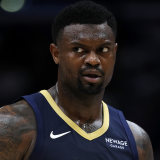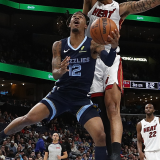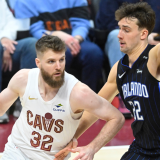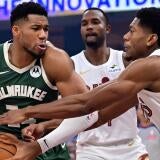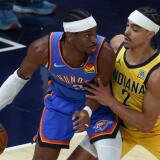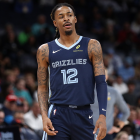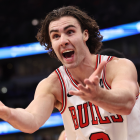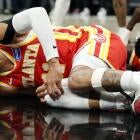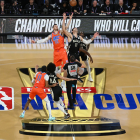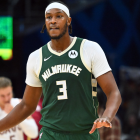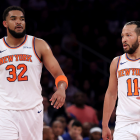NBA All-Quarter Century Teams: LeBron, Kobe, Steph are locks, but center and power forward debates get tricky
CBS Sports has selected the three best players at each position over the last 25 years
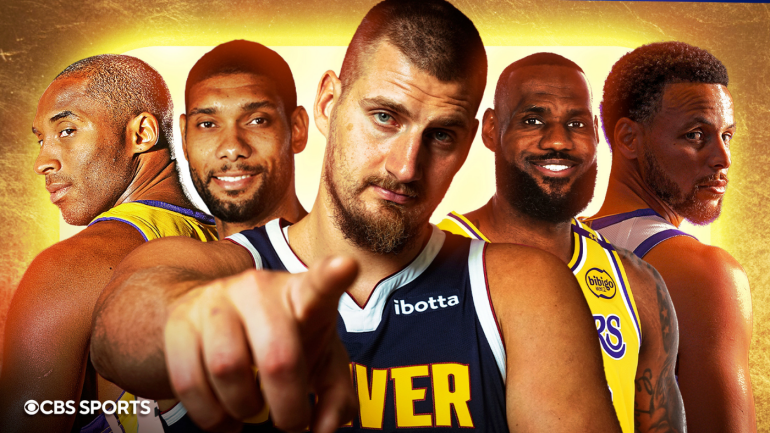
Every year, basketball media votes on All-NBA Teams, which create a snapshot of each season. Which players mattered most? Who do we need to remember from that season? Who stood out in a way that even an All-Star nod could not fairly reflect? All-NBA is such an important honor that it even affects how much players get paid, as it is the most frequent qualifying tool for a supermax contract. Aside from MVP and perhaps Defensive Player of the Year, it is the highest individual honor a player can receive in a given season.
We've now played out 25 full NBA seasons this century. That means that a quarter of the 21st century is in the books, so we decided to look back on the last 25 years of basketball and ask ourselves those same questions. Who stood out? Who mattered? Who would we place on our own All-Century Teams?
The exercise, in some respects, is intended to mimic the standard All-NBA formula. We select three All-NBA Teams each season. We have selected three All-Century teams below.
In other ways, we will deviate. Anything a player did starting on Jan. 1, 2000 is fair game, including the playoffs. The NBA has gotten away from using positions in All-NBA voting, making it purely a method of ranking the 15 best players in a given season. We've gone the other way. Not only are we using positional designations, but specific ones. These teams will not feature two guards, two forwards and a center. They will feature a point guard, a shooting guard, a small forward, a power forward and a center.
Why did we choose to format our teams this way? First of all, the position-less NBA is still a relatively new phenomenon. When the century began, positional designations still meant quite a bit. We chose to honor that. The second and perhaps more significant reason? To make it more challenging. Every player was designated a specific position. The goal here was to force ourselves into the actual debates in which fans have been engaging for the last 25 years.
And so, with that in mind, here are our NBA All-Century Teams, as voted on by the CBS Sports NBA staff.
All-Quarter Century First Team
- PG: Stephen Curry
- SG: Kobe Bryant
- SF: LeBron James
- PF: Tim Duncan
- C: Nikola Jokić
Four of our slots were decided unanimously, so let's just roll through them quickly:
- Stephen Curry is a two-time MVP and four-time champion. We all know the broader résumé by now. He was arguably the key catalyst for the NBA's 3-point revolution and, aside from the small forward on this team, is the most accomplished player in the NBA today. Interestingly, he's a fairly unorthodox point guard. He is point-guard sized, but at Golden State's peak, he neither defended the best point guards (a task undertaken by the bigger, more defensively inclined Klay Thompson) nor its primary playmaker (a role still held by Draymond Green to this day). That feels fitting in the context of all-time point guards, though, because the 6-foot-9 Magic Johnson, Curry's only competition for the title of best point guard ever, was also an unconventional player at that position.
- Kobe Bryant is this century's stylistic analogue for Michael Jordan. Though not quite as accomplished or revered, he was the clear choice for First Team shooting guard as a five-time champion and the 2008 MVP. He scored the most points in a 21st century game (81), and when you adjust for things like pace and leaguewide offensive efficiency, his 2006 average of 35.4 points per game is arguably the most prolific scoring season in NBA history.
- LeBron James might be the greatest basketball player who has ever lived. If he loses that argument to Jordan, he still certainly emerges as not only the 21st century's best small forward, but also its best player. Four MVPs. Four championships. More points than any player in history. Fourth in assists. Fifth in triple-doubles. Among the most versatile defenders the sport has ever seen. If ever the NBA produced a player with no weaknesses, it's James. He was and remains great at basically everything.
- Tim Duncan was going to be a First-Team pick no matter what. The question here was which position? He is widely regarded as the greatest power forward of all time, but he was a center in college and only moved to power forward in the pros because of David Robinson. The Admiral retired in 2003, though, and Duncan proceeded to spend far more of his minutes at center. Basketball Reference estimates that he actually spent more time at center (60% of his career minutes) than power forward (39%). However, 14 of his 15 All-NBA selections came as a forward. His peak came as either an exclusive power forward or when he was splitting his time. Ultimately, that felt like the appropriate choice. As you'll see below, this creates a major logjam at the center position we'll have to eventually solve.
Jokić vs. Shaq
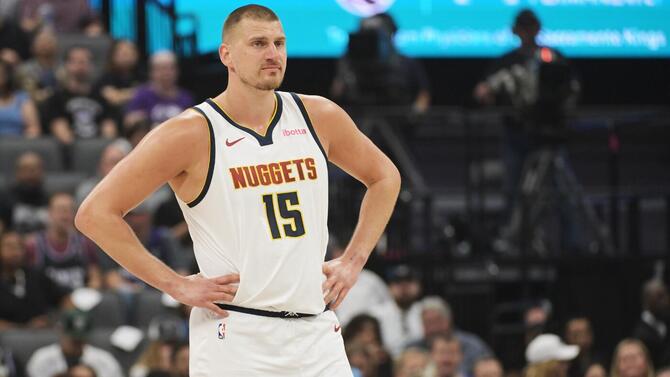
The real question here came at center. If this were purely an all-time ranking, Shaquille O'Neal would probably still have a comfortable edge over Nikola Jokić. However, we're only measuring what has happened this century. O'Neal was drafted in 1992, so we're chopping off an enormous chunk of his career. That feels appropriate, though, as Jokić is only 30. We're not counting the beginning of Shaq's career, but we haven't even seen the end of Jokić's.
It ultimately balances out pretty nicely. Jokić has played 745 regular-season games and 94 playoff games. In seasons that concluded during the 21st century, O'Neal played 752 regular-season games and 150 playoff games. The samples are suddenly pretty similar, so we can focus primarily on performance.
In terms of winning, O'Neal has the obvious edge. He won four championships. Jokić has one. The elephant in the room here is that O'Neal did so with far better teammates. Jokić, famously, has never played with an All-Star. O'Neal had at least one teammate chosen for the All-Star Game in every 21st century season he played in. That's nine in total, though in fairness, almost half of them (four) came in his final year, with the 2011 Celtics. During his championship years, though, he was always flanked by either our First Team shooting guard, Bryant, or our Second Team shooting guard, Dwyane Wade. In context, it hardly seems appropriate to punish Jokić for having inferior teammates. He also plays in an era in which it's far harder for individual stars to rack up titles. We've had seven champions in the past seven years.
Additionally, Jokić's playoff numbers are a shade better. He averaged more points (27.4 to 23.3), rebounds (12.3 to 11.9) and assists (7.6 to 2.4) while scoring a bit more efficiently and never needing to leave the floor because of his free-throw vulnerability. The regular-season numbers tell a similar tale. Jokić holds the edge in most statistical categories, and the advanced numbers, as they so often do when comparing Jokić to practically anyone, suggests that this matchup might even be a bit lopsided. O'Neal was a better defender than Jokić at his peak, but any conditioning-related critiques one could levy against Jokić certainly apply to O'Neal. Shaq just played in an era less equipped to punish bigger, less-mobile big men.
In the end, our voters therefore leaned toward Jokić. Of course, what O'Neal did in the 90s shouldn't be ignored in any all-time conversations. So if Jokić wants to pass Shaq on that front, he still has a fair bit of work to do.
All-Quarter Century Second Team
- PG: Chris Paul
- SG: Dwyane Wade
- SF: Kevin Durant
- PF: Giannis Antetokounmpo
- C: Shaquille O'Neal
A bit more debate started to creep in with the Second-Team selections. O'Neal and Jokić split the center vote, so O'Neal slides in easily as our big man. Kevin Durant was the only unanimous choice for the other four slots, and that's hardly a surprise. He's a four-time scoring champion, and given his unique combination of shooting and size, is frequently listed as one of the most unguardable players in basketball history. Toss in his underrated defense and this one was easy. He's openly complained about coming in second to James, but across a quarter century, there's no shame in that.
Wade vs. Harden
This one comes down to what you prioritize. Statistically, Harden laps Wade. He's scored more points and has done so more efficiently. He's a more prolific rebounder and assister. Harden is a three-time scoring champion. But Wade is a three-time NBA champion, and that's where the biggest difference lies. Harden is actually a more prolific playoff scorer, but he has that nasty penchant for disappearing in the biggest moments. Wade doesn't have those bizarre, single-digit closeout games on his résumé. Even if it was assisted by some pretty questionable officiating, his 2006 Finals performance was a spectacular, career-altering moment. Harden doesn't have that. He doesn't compare defensively, either, as Wade is the greatest shot-blocking guard of all time and was an absolute menace when he needed to be. Even if Harden's list of regular-season accomplishments is unimpeachable, our voters trusted Wade more when it counted.
Paul vs. Nash
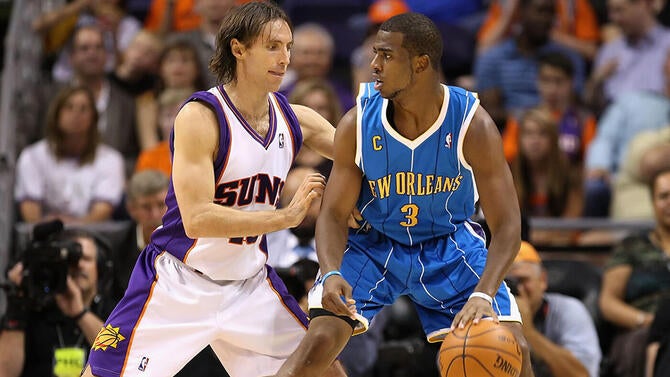
This is a fitting battle for our second point guard slot. They were both small, Western Conference point guards whose stellar clutch résumés are usually overlooked because they never won a championship. In both cases, that was arguably the result of bad luck. Nash might've won his had several key teammates not been suspended from a key series against the Spurs in 2007. Paul suffered a hamstring injury one win short of a postseason triumph over Golden State in 2018, and then lost four straight games to Milwaukee in the 2021 Finals. Nash and Paul were perhaps the best playmakers of their era. Paul won out largely because he was more well-rounded. He made nine All-Defensive teams. Nash was a defensive liability. Paul was always far more willing to scale up as a scorer when needed. His mid-range shot is deadly even into his 40s. Nash has spoken openly about regretting his reluctance to shoot more.
As a cherry on top here, Paul is quite possibly the most clutch regular-season player of all time. At his peak, having Paul more or less ensured an elite clutch offense. In 2018, he led the Rockets to the highest clutch offensive rating in the NBA. He did the same for the Thunder in 2020 and the Suns in 2022. Three times, his Clippers were in the top three during a five-year span. This is basically impossible because of how small the samples are. But Paul was that good late in games, and a very worthy Second Team pick.
Giannis vs. KG vs. Dirk
And now, we've reached the power forward debate. The decision to make Duncan a power forward instead of a center meant that there would only be two remaining All-Century slots for three players. Giannis Antetokounmpo, Kevin Garnett and Dirk Nowitzki are all MVPs and one-time champions. Antetokounmpo has played the least of the three, but his entire career has been in the 21st century. Garnett and Nowitzki lost years to the 90s. All three got Second Team votes. However, Antetokounmpo pulled ahead relatively comfortably.
It makes sense when you think of the power forward position as a spectrum. Garnett was a historic defender but, by all-time standards, wasn't a special scorer. He never averaged 25 points in a season. Nowitzki was on the other end. He was a first-of-his-kind offensive player at the position. Power forwards who could make 3s and create their own shots from anywhere on the floor didn't exist before him. But he was a weak defender even for his time. If Garnett and Nowitzki represent the extremes, Antetokounmpo is the middle ground. Perhaps he wasn't as great as Garnett defensively, but he is a former Defensive Player of the Year in his own right. Perhaps he isn't the shot-maker Nowitzki was, but his ability to get to the rim is still historic enough to make him an absolutely elite offensive player. Picking Antetokounmpo presents the fewest compromises of the trio. You're losing spacing, but you're getting a dominant player on both ends of the floor. That gave him the edge in a close power forward race.
All-Quarter Century Third Team
- PG: Steve Nash
- SG: James Harden
- SF: Kawhi Leonard
- PF: Dirk Nowitzki
- C: Dwight Howard
Let's settle the point guard questions first. There are certainly readers who would argue that Luka Dončić or Shai Gilgeous-Alexander has already done enough to warrant a selection here. This is all you need to know about Nash to understand why he got the nod: between the 2001-02 and 2009-10 seasons, Nash was the starting point guard for the No. 1 ranked offense in the NBA eight times in nine years. Did he play with great players in that span? Yes, but he had the top-rated offense in a season that Amar'e Stoudemire missed. Did he play for great coaches in that span? Also yes, but those eight seasons included four different head coaches. In many of these seasons, it wasn't even close. Kobe Bryant and LeBron James have led the No. 1 offense only once apiece in their careers. Stephen Curry has done it three times. Jokić has never done it. That's how incredible Nash's run was in the context of the league he played in. He's one of the greatest generators of team offense in NBA history.
Kawhi Leonard was an easy small forward choice. The voters picked him unanimously, and it feels fitting that he's sharing the wing here with Harden. One of them is an all-time regular-season performer with a disappointingly thin playoff résumé. The other is one of the all-time playoff boogeymen, but his durability has left him with a relatively unimpressive regular-season track record. Leonard has made only six All-Star Games, for instance. Everyone else on this list has made eight or more. Combine Harden and Leonard and you get basically the perfect basketball player. Separately, you get two Third Team picks.
It's a shame that injuries have ruined the last three playoff series between Leonard and Durant. Durant's longevity made him an obvious pick for any career-based honors, but we never really got to see the two of them battle in the postseason in their primes. Leonard wasn't quite himself yet during those early Thunder-Spurs battles. He grew into an MVP candidate in 2017, when Durant went to the Warriors. Those series might have given us a chance to measure which of the two were better at their absolute peaks. Alas, the injury gods deprived us of that opportunity.
This brings us to the frontcourt. Had we counted Duncan as a center, this process would be straightforward. He'd be the First Team center, and we'd have two obvious picks for the next two teams. Antetokounmpo, Nowitzki and Garnett would have fought for placement, but all three would have made the cut. Instead, we now have a situation in which there are four power forwards for three spots, but only two slam-dunk centers for the same number of slots.
Howard vs. AD vs. Embiid
Let's start with the centers. Anthony Davis and Joel Embiid both got votes, but both are still active, and both come with drawbacks. For Embiid, it's durability and playoff performance. Davis has a better playoff track record than Embiid does, but his shooting in the Orlando bubble was such an outlier that many disregard his best postseason altogether. He's not as much of an injury risk as Embiid, but he's certainly struggled to stay on the court. Combined, they've played 1,239 regular-season games -- fewer than Dwight Howard's 1,242 on his own.
Longevity isn't the only factor in Howard's favor, of course. We're talking about a three-time Defensive Player of the Year. Even if it came during an admittedly down period for centers, Howard was unquestionably the best big man in the NBA for a pretty lengthy stretch. He was the best player on a Finals team with the 2009 Magic, a feat neither Davis nor Embiid ever matched. For all of the complaints about his fixation on inefficient post-ups, Howard's rim gravity was still significant enough to power Orlando's ahead-of-its-time, 3-point heavy offense. He might not have quite reached the peak that Davis or Embiid did, but his overall 21st century body of work, for the time being at least, remains superior.
Dirk vs. KG
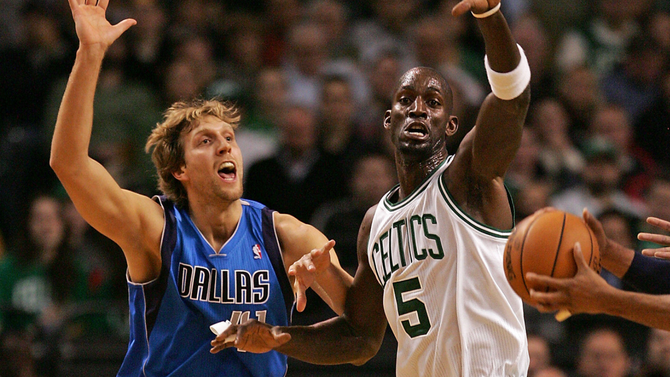
And so, we can avoid it no longer: the power forward debate. I'd be lying if I said I hadn't looked for ways to avoid it. Nowitzki technically made an All-NBA Team at center in 2002, but if we weren't going to count Duncan as one, we certainly couldn't count Dirk. This was far and away the hardest choice on the ballot, and sure enough, the votes actually landed in a tie between Nowitzki and Garnett. A tiebreaking voter was brought in, and he chose Nowitzki for a simple reason: almost none of his production came in the 90s, whereas Garnett made multiple All-Star Teams that we just couldn't count.
That's how close this was. Voters had to split hairs between two legendary and trailblazing players. Nowitzki laid the groundwork for today's more versatile brand of offense-first power forwards. Before him, the position was often used for a slightly smaller center. Garnett created the defensive template so many teams employ at power forward nowadays. He wasn't just a bruiser in the post. He was one of the first big men capable of comfortably guarding on the perimeter. Forget about switching, he could straight-up guard wings as full-game matchups when necessary. Duncan may be the best power forward ever, but Nowitzki and Garnett were the two most responsible for making the position what it is today.
Garnett probably opened more doors for teams. He fit with basically anyone, and in the modern game, he almost certainly would have extended his jumper's range beyond the arc. His playmaking, more of a luxury at the time, would be a bit more foundational to his team's system. Coaches know how to build an offense through a passing big man now. The modern league would likely have been slightly less kind to Nowitzki because coaches are far more eager to pick at vulnerable defenders. But his shot-making, especially late in games, would be absolutely lethal with contemporary spacing. Of course, they didn't play in the modern league, so Nowitzki's weaknesses weren't as glaring, while Garnett's strengths weren't maximized to the extent that they could have been.
My personal vote went to Garnett. The staff was fully divided, and there's nothing wrong with a tie between two players of this caliber. They could not be more different as players, so ultimately, there are circumstances in which you'd likely prefer either.


